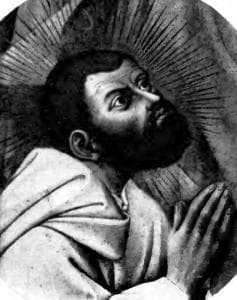
Blessed John Colombini
Blessed
Feast Day: July 31
Death: July 31, 1367
Biography
Blessed John Colombini, also known as John Columbini or Giovanni, was born around the year 1300 in Siena, Italy. He came from a wealthy and influential patrician family, and from an early age, he exhibited traits of greed, ambition, and a quick-temper. John married and had two children, a son named Peter and a daughter named Angela.
As a prominent figure in Sienese society, John held the position of the first magistrate, known as the Gonfalionere, in the city. However, his life took a dramatic turn when he experienced a profound conversion to the Catholic faith. This transformation came about as he read the story of the conversion of Saint Mary of Egypt, which deeply touched his heart and led him to reexamine his own life.
Motivated by his newfound faith, John embarked on a journey of personal and spiritual reform. He recognized the errors of his past ways and sought redemption through acts of penance and charity. John's change of heart led him to visit hospitals, tend to the sick, and generously give to the poor. But it was his devotion to the poorest and most forgotten members of society that became the hallmark of his reformed life.
Tragedy struck John's family when his son Peter passed away, leaving him grief-stricken. Following her brother's death, Angela decided to become a nun, dedicating her life to God. In response, John established an annuity to ensure his wife could live comfortably, while he entrusted the remainder of his wealth to endow a hospital and two convents. From then on, he chose to live in poverty, relying on begging for his daily sustenance.
John's unwavering dedication to his newfound faith and his selfless acts of charity caught the attention of many young men from wealthy families who were disillusioned with their privileged lives. They felt a profound calling to God and a desire to renounce their wealth in pursuit of a meaningful existence. These young men became John's followers, and together they formed a small group of laymen known as the Jesuati (also spelled Gesuati or Jesuats). The name was derived from their habit of exclaiming, "Praise be to Jesus Christ," in response to all things.
The Jesuati embraced a life of penance, charity, and special devotion to Saint Jerome. Pope Urban V acknowledged the group's piety and mission, granting them official approval in 1367, a mere 37 days before John's death.
Throughout his life, John Colombini remained dedicated to serving the Lord and fulfilling his mission to care for the sick and the poor. His selfless actions inspired many to devote themselves to a life of simplicity and charity. The legacy of the Jesuati endured until 1668 when, due to certain abuses that had infiltrated the group over time, it was suppressed by Pope Clement IX.
In addition to the Jesuati, a sister organization known as the Jesuatesses or Sisters of the Visitation of Mary was founded around 1367 by John's cousin, Blessed Catharine Colombini. This community of religious women shared a similar devotion to charity and a life of penance. However, the order eventually disappeared in 1872 due to attrition.
Blessed John Colombini is portrayed in iconography as a barefooted man wearing a white habit, adorned with a dark leather belt. On his chest, he is depicted with the letters "IHS," which symbolize the Holy Name of Jesus. Furthermore, his representation showcases him caring for the sick and grinding riches beneath his feet, illustrating his renunciation of worldly wealth.
Blessed John Colombini passed away on July 31, 1367, due to natural causes while on the road to Acquapendente, Italy. His beatification was proclaimed by Pope Gregory XIII, recognizing his exemplary life of conversion, penance, and devoted service to the poor and marginalized.